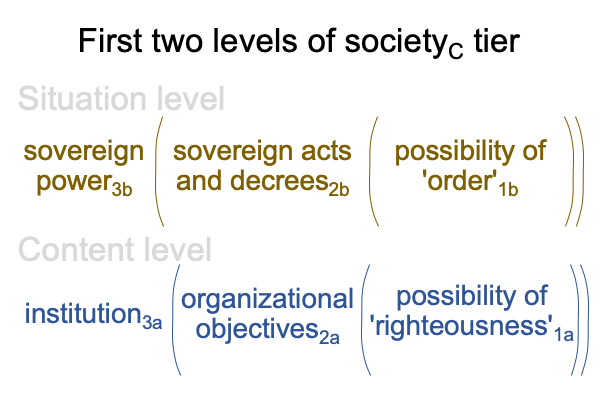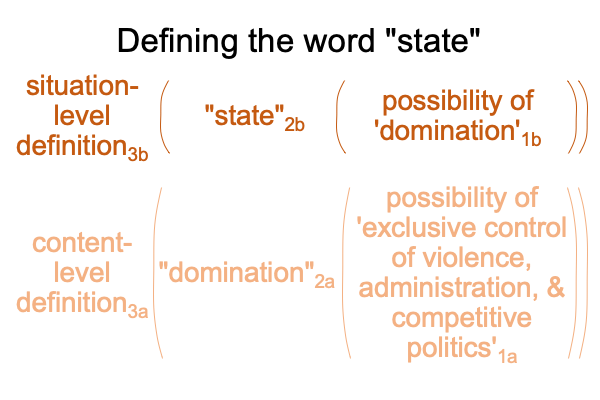0234 What does it mean for sovereign power3b to be confounded with a situation-level definition3b of the spoken term, “state”2b?
0235 A pair of two-level interscopes stand before me.
The first corresponds to the first two levels of the societyC tier.

The second corresponds to the situation-level definition of the term, “state”, derived from Graeber and Wengrow’s theory, plus a content-level definition of the term, “domination”.

0236 Normal contexts3 exhibit the logics of exclusion, complement or alignment.
Once again, I ask, “Do the situation-level normal contexts exclude one another, complement one another, or align with one another?”
The first option is sovereign action without the state. Or, is it a state without sovereign acts?
I suspect that this option describes the conditions where situation-level sovereign power3b has not differentiated from other institutions3a. Every institution3a exercises disciplinary power, which is similar to sovereign action without the state. Every institution enforces its disciplinary powers, which are similar to domination.
The second option may correspond to the first and second-order regimes illustrated by Graeber and Wengrow.
The third option is the civilizational state (you know, like the one that the indigenous people of the Eastern Woodlands of North America criticize before their utter ruin).
0237 It makes me wonder whether the fashionable terms of “liberty, equality and fraternity”, used by the so-called “left”, in favor of state intervention for every social organization, might be a form of righteousness1a that manifests as the potentials1a underlying the term, domination”2a.
0238 Consider the Ubaid period of southern Mesopotamia, ranging from 5800 to 4000 B.C.
The administration of information seems to be devoted to mitigating social domination as an unintended consequence of labor specialization. Some Ubaid labor specializations are more rewarding than others. So, a sovereign bureaucracy strives to prevent the more affluent from lording over the less affluent. Was this bureaucracy itself a form of domination? Well, yes, it dominated in order to mitigate… um… domination due to spontaneous social inequality.
0239 Indeed, the history of coincidences between order1b and controlling coercion1a, administering information1a and championing charismatic power1a, is mixed, suggesting that the state2b has no origin.
Instead, the term, “state”2b, stands as a sign of contradiction to the term, “outlaw”2b. The “domination”2a that supports the “state”2b is precisely opposed to the “domination”2a that supports the “outlaw”2b.
It is no wonder that, over time, Mesopotamian, Egyptian and Chinese rulers proclaim themselves to be protectors of the weak, feeders of the hungry, and solace for widows and orphans.
What better way to distinguish the “domination”2a underlying the “state”2b from the one2a underlying the “outlaw”2b?
0240 What goes unseen in this discussion?
The meaning, presence and message1a underlying the term, “domination”2a, does not coincide with the potential of the content-level of the society tier: righteousness1a.
0241 Yes, a strange contradiction can no longer hide.
